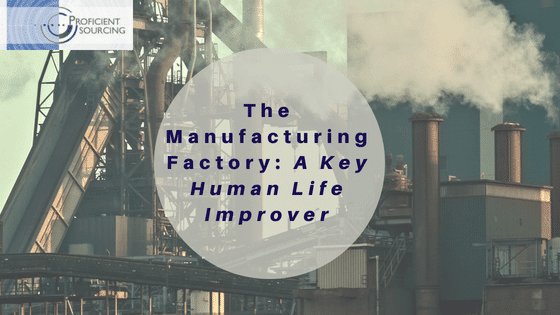
Almost every object we touch in life came from a factory somewhere. This is a relatively new thing in human history, and took a great deal of combined innovations to become possible. A large number of people working in an organized and coordinated way did not occur until the late 1700’s. Since Proficient Sourcing is involved in finding sources for your factory’s outsourced parts or assemblies, we are most interested in such history.
Recently we have found a couple of books that recount the development of key inventions and the history of large manufacturing factories. One of the themes of these books is that human life in 1800 or so was not much different than that of 10,000 BC. Since then we’ve advanced at a very rapid rate due to technological developments, and obviously manufacturing factories have been a vital part of that.
The 5 key inventions are covered in detail in The rise and fall of American growth : the U.S. standard of living since the Civil War by Robert J. Gordon. The author’s point is that these 5 inventions caused the most important improvements in human life .. ever.
The factory history book, Behemoth, by Joseph Freeman, contained a large number of insights those of you interested in the history of manufacturing might find worthy of further study. We’ll highlight a few of those here to pique your interest.
“The factory led a revolution that transformed human life and the global environment. For most of human history up to the initial stirrings of the Industrial Revolution and the creation of the first factories in the early eighteenth century, the vast majority of the world population was rural and poor, living precarious existences plagued by hunger and disease”.
Consider that with no means of travel other than the horse, and no method of communicating broadly, people had no means of engaging with others in distant locations. It’s also likely most people were completely unaware of other countries, races, and cultures. And so the evolution of machinery, first with water power and then steam, required lots of people to get to a factory and work a regular schedule for the first time. As you might imagine, this led to any number of changes in human life.
“Average annual per capita growth of global economic output during the period between the birth of Jesus and the first factory was essentially….ZERO. In the eighteenth century it began nudging up and between 1820 nnd 1913 approached ONE percent. In the years since it has been higher, with a peak, between 1950 and 1970, of nearly 3 percent”.
“The biggest factories in history are operating right now, making products like smart phones, laptops, and brand name sneakers that for billions of people around the world define what it means to be modern. These factories are staggeringly large, with 100, 000 200,000 or more workers. Outsized factories have been a feature of industrial life for more than two centuries”.
“Factories produce the food we eat, the medicines we take, the cars we drive, the caskets we are buried in. Most of us would find it extremely difficult to survive, even for a brief time, without factory-made goods. Yet in most countries, except for the factory workers themselves, people pay little attention to the industrial facilities on which they depend”
And so those of us involved in manufacturing factories can take great pride in being part of a major engine of human improvement. Congratulations to us all!

